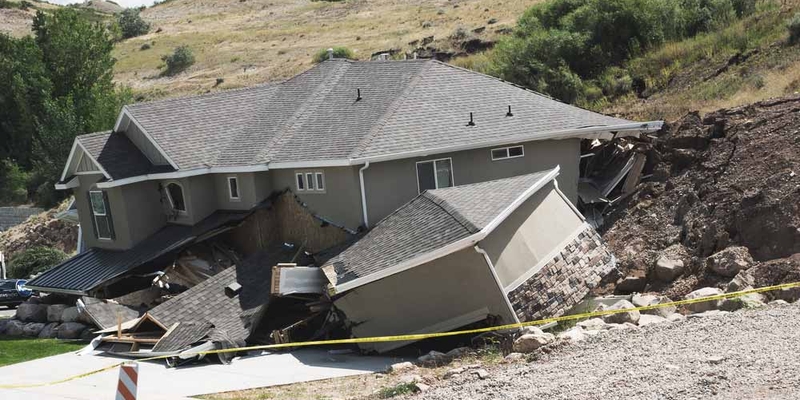
If you are not redirected within 30 seconds, please click here to continue.
Samedi: 10h – 16h HAE

If you are not redirected within 30 seconds, please click here to continue.
If you are not redirected within 30 seconds, please click here to continue.
Should You Add Earthquake Protection to Your Home Insurance Policy?

- Earthquake coverage is not typically included in a standard home, condo, or tenant insurance policy.
- The Global Risk Institute found Canada “is uniquely unprepared to tackle quake losses among industrialized nations with high quake potential.”
- The cost of adding earthquake coverage to your existing home insurance policy varies across the country and depends on both the limit and deductible selected.
Depending on which region in Canada you live, earthquakes may not be a common occurrence. Thus, it’s unlikely most Canadians have coverage in their home insurance policies to pay for seismic damages to their homes and personal belongings. Earthquake insurance is not typically included in a standard home, condo, or tenant insurance policy.
However, according to data from National Resources Canada, more than 5,000 earthquakes shake Canada annually, that’s 14 earthquakes per day on average(!). Though the majority of them are small and barely noticeable, 50 of them are felt each year.
The region that is the most seismically active area is along the west coast of British Columbia. The St. Lawrence Seaway, the Ottawa River Valley, and certain parts of the three northern territories are also at risk of earthquakes. Vancouver and Victoria may be the most vulnerable cities, but Ottawa, Montreal, and parts of Quebec are all susceptible to the possibility of an earthquake.
Earthquakes Canada, meanwhile, tracks all earthquakes across the country great and small. The federal government agency also recently launched an Earthquake Early Warning website to help reduce injuries, deaths, and property losses. In 2021, the most recent quake to occur was a minor 4.2 magnitude rattler recorded on June 11 near Fort McPherson, Northwest Territories.
Don't waste time calling around for home insurance
Use RATESDOTCA to shop around and compare multiple quotes at the same time.
Finding the best home insurance coverage has never been so easy!
How likely is an earthquake in Canada?
Residents in B.C. and the Ottawa-Montreal-Quebec corridor believe a devastating earthquake is a long way off and wouldn’t happen for at least 50 years, according to an IBC poll conducted in 2013 by Pollara Strategic Insights.
In Quebec, which has a 5% to 15% risk of a major quake, a whopping 91% of respondents say they never considered buying earthquake coverage because they don’t think they need it. Interestingly, 70% of B.C. residents feel the same.
The 2013 survey also found residents mistakenly thought their home insurance (71%) or government disaster aid (38%) would help take care of any resulting damage. While some home policies do include coverage for earthquakes, most do not.
More recently, about 65% of homeowners in B.C. have earthquake insurance, but only about 4% in Quebec despite Canada’s earthquake hazard maps clearly showing parts of the province to be seismically active, according to the Insurance Bureau of Canada (IBC). In its “2020 Facts of the Property and Casualty Insurance Industry in Canada” report, the industry association also states it is conducting a detailed survey on the status of earthquake insurance products across the country.
Alarmingly, the Global Risk Institute found Canada “is uniquely unprepared to tackle quake losses among industrialized nations with high quake potential.”
How much damage would an earthquake in Canada cause?
An earlier earthquake impact study commissioned by IBC illustrates that the economic impact of a 9.0 magnitude earthquake in Western Canada would result in $75 billion in total financial losses and $20 billion in insured losses. While the ground shaking would account for the majority of losses, the report says resulting landslides, a possible tsunami, and fires following the rupture would also contribute heavily to the widespread damage.
Similarly, a 7.1 magnitude quake in the Ottawa-Montreal-Quebec City corridor may cause $60 billion worth of economic losses and $12 billion in insured losses. A 7.1 magnitude earthquake in that region is powerful enough to be felt across much of Ontario, Quebec, New Brunswick, Nova Scotia and in parts of the northeastern U.S.
What does earthquake insurance cover?
Earthquake insurance typically covers the costs of the loss or damage caused to your home and its contents resulting from the shaking of the earth — not fire, explosions, sinkholes or tsunami damage that may happen as a result of an earthquake. It also does not cover the cost of damage to your vehicle caused by an earthquake (you need to have optional comprehensive coverage added to your car insurance policy to protect your vehicle from damages caused by a natural disaster).
In 2019, the Insurance Brokers Association of Canada launched an awareness campaign called, “The Big If”, outlining for Canadians the threat earthquakes and overland flooding poses. If you are uncertain about what your home insurance policy coverage provides, speak to your insurance agent or broker to get the clarification you need.
How much does earthquake insurance cost?
The cost of adding earthquake coverage to your existing home insurance policy varies across the country and depends on both the limit and deductible selected. Your home’s location is important; the price is higher in higher risk areas. For example, the cost of earthquake insurance for a $300,000 home and its contents in Toronto is approximately $15 annually. By comparison, the same policy costs $332 annually in Vancouver.
What to do after an earthquake
In the unfortunate event you experience an earthquake in your region, IBC recommends taking the following steps afterward:
- Check your home for structural damage if it is safe to do so
- Do not shut off utilities unless they are damaged
- Refrain from lighting matches or turning on electric light unless you are sure there are no gas leaks
- Avoid flushing the toilet if you suspect nearby sewer lines may be damaged
- Be cautious of debris and broken glass
- Stay a minimum of 10 metres away from downed power lines
To adequately deal with any natural disaster, preparation is the difference-maker. On that note, Public Safety Canada recommends Canadians keep an emergency disaster safety kit at home with items such as:
- Two litres of water per person per day
- Canned food, energy bars, and other non-perishables
- A manual can opener
- A flashlight and batteries
- A first-aid kit
Get money-saving tips in your inbox.
Stay on top of personal finance tips from our money experts!










